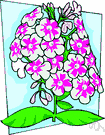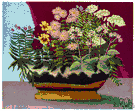flora
Also found in: Thesaurus, Medical, Acronyms, Idioms, Encyclopedia, Wikipedia.
Related to flora: Gut flora
Flo·ra
(flôr′ə)n. Roman Mythology
The goddess of flowers.
flo·ra
(flôr′ə)n. pl. flo·ras or flo·rae (flôr′ē′)
1. (used with a sing. or pl. verb) Plants considered as a group, especially the plants of a particular country, region, or time.
2. A treatise describing the plants of a region or time.
3. The bacteria and other microorganisms that normally inhabit a bodily organ or part: intestinal flora.
[From Flora.]
American Heritage® Dictionary of the English Language, Fifth Edition. Copyright © 2016 by Houghton Mifflin Harcourt Publishing Company. Published by Houghton Mifflin Harcourt Publishing Company. All rights reserved.
flora
(ˈflɔːrə)n, pl -ras or -rae (-riː)
1. (Botany) all the plant life of a given place or time
2. (Botany) a descriptive list of such plants, often including a key for identification
3. (Physiology) short for intestinal flora
[C18: from New Latin, from Latin Flōra goddess of flowers, from flōs flower]
Flora
(ˈflɔːrə)n
(Classical Myth & Legend) the Roman goddess of flowers
[C16: from Latin, from flōs flower]
Collins English Dictionary – Complete and Unabridged, 12th Edition 2014 © HarperCollins Publishers 1991, 1994, 1998, 2000, 2003, 2006, 2007, 2009, 2011, 2014
flo•ra
(ˈflɔr ə, ˈfloʊr ə)n., pl. flo•ras, flo•rae (ˈflɔr i, ˈfloʊr i) for 2.
1. the plants of a particular region or period, listed by species and considered as a whole.
2. a work systematically describing such plants.
3. plants, as distinguished from fauna.
4. the aggregate of bacteria, fungi, and other microorganisms occurring on or within the body: intestinal flora.
[1655–65; < New Latin, Latin Flōra the Roman goddess of flowers]
Random House Kernerman Webster's College Dictionary, © 2010 K Dictionaries Ltd. Copyright 2005, 1997, 1991 by Random House, Inc. All rights reserved.
flo·ra
(flôr′ə) The plants of a particular region or time period: desert flora; prehistoric flora.
The American Heritage® Student Science Dictionary, Second Edition. Copyright © 2014 by Houghton Mifflin Harcourt Publishing Company. Published by Houghton Mifflin Harcourt Publishing Company. All rights reserved.
flora
All plants occupying a major geographical region.
Dictionary of Unfamiliar Words by Diagram Group Copyright © 2008 by Diagram Visual Information Limited
ThesaurusAntonymsRelated WordsSynonymsLegend:
Switch to new thesaurus
| Noun | 1. |  flora - all the plant life in a particular region or period; "Pleistocene vegetation"; "the flora of southern California"; "the botany of China" flora - all the plant life in a particular region or period; "Pleistocene vegetation"; "the flora of southern California"; "the botany of China"aggregation, collection, accumulation, assemblage - several things grouped together or considered as a whole browse - vegetation (such as young shoots, twigs, and leaves) that is suitable for animals to eat; "a deer needs to eat twenty pounds of browse every day" growth - vegetation that has grown; "a growth of trees"; "the only growth was some salt grass" stand - a growth of similar plants (usually trees) in a particular area; "they cut down a stand of trees" shrubbery - a collection of shrubs growing together garden - the flowers or vegetables or fruits or herbs that are cultivated in a garden ground cover, groundcover - low-growing plants planted in deep shade or on a steep slope where turf is difficult to grow mown, cut - (used of grass or vegetation) cut down with a hand implement or machine; "the smell of newly mown hay" |
| 2. |  flora - (botany) a living organism lacking the power of locomotion flora - (botany) a living organism lacking the power of locomotionorganism, being - a living thing that has (or can develop) the ability to act or function independently botanical medicine, herbal therapy, phytotherapy - the use of plants or plant extracts for medicinal purposes (especially plants that are not part of the normal diet) microorganism, micro-organism - any organism of microscopic size phytoplankton - photosynthetic or plant constituent of plankton; mainly unicellular algae parasite - an animal or plant that lives in or on a host (another animal or plant); it obtains nourishment from the host without benefiting or killing the host coca - dried leaves of the coca plant (and related plants that also contain cocaine); chewed by Andean people for their stimulating effect fugaciousness, fugacity - the lack of enduring qualities (used chiefly of plant parts) circulation - free movement or passage (as of cytoplasm within a cell or sap through a plant); "ocean circulation is an important part of global climate"; "a fan aids air circulation" botany, flora, vegetation - all the plant life in a particular region or period; "Pleistocene vegetation"; "the flora of southern California"; "the botany of China" kingdom Plantae, plant kingdom, Plantae - (botany) the taxonomic kingdom comprising all living or extinct plants microflora - microscopic plants; bacteria are often considered to be microflora crop - a cultivated plant that is grown commercially on a large scale endemic - a plant that is native to a certain limited area; "it is an endemic found only this island" holophyte - an organism that produces its own food by photosynthesis non-flowering plant - a plant that does not bear flowers plantlet - a young plant or a small plant wilding - a wild uncultivated plant (especially a wild apple or crabapple tree) ornamental - any plant grown for its beauty or ornamental value pot plant - a plant suitable for growing in a flowerpot (especially indoors) acrogen - any flowerless plant such as a fern (pteridophyte) or moss (bryophyte) in which growth occurs only at the tip of the main stem apomict - a plant that reproduces or is reproduced by apomixis aquatic - a plant that lives in or on water cryptogam - formerly recognized taxonomic group including all flowerless and seedless plants that reproduce by means of spores: ferns, mosses, algae, fungi annual - (botany) a plant that completes its entire life cycle within the space of a year biennial - (botany) a plant having a life cycle that normally takes two seasons from germination to death to complete; flowering biennials usually bloom and fruit in the second season perennial - (botany) a plant lasting for three seasons or more escape - a plant originally cultivated but now growing wild hygrophyte - a plant that grows in a moist habitat neophyte - a plant that is found in an area where it had not been recorded previously embryo - (botany) a minute rudimentary plant contained within a seed or an archegonium sporophyte - the spore-producing individual or phase in the life cycle of a plant having alternation of generations gametophyte - the gamete-bearing individual or phase in the life cycle of a plant having alternation of generations houseplant - any of a variety of plants grown indoors for decorative purposes garden plant - any of a variety of plants usually grown especially in a flower or herb garden tracheophyte, vascular plant - green plant having a vascular system: ferns, gymnosperms, angiosperms plant part, plant structure - any part of a plant or fungus poisonous plant - a plant that when touched or ingested in sufficient quantity can be harmful or fatal to an organism aerophyte, air plant, epiphyte, epiphytic plant - plant that derives moisture and nutrients from the air and rain; usually grows on another plant but not parasitic on it rock plant - plant that grows on or among rocks or is suitable for a rock garden autophyte, autophytic plant, autotroph, autotrophic organism - plant capable of synthesizing its own food from simple organic substances squamule - a minute scale myrmecophyte - plant that affords shelter or food to ants that live in symbiotic relations with it nitrification - the oxidation of ammonium compounds in dead organic material into nitrates and nitrites by soil bacteria (making nitrogen available to plants) |
Based on WordNet 3.0, Farlex clipart collection. © 2003-2012 Princeton University, Farlex Inc.
flora
noun plants, vegetation an extraordinary variety of flora and fauna
Collins Thesaurus of the English Language – Complete and Unabridged 2nd Edition. 2002 © HarperCollins Publishers 1995, 2002
Translations
flóra
floraplanteverden
kasvisto
FloreFlora
flora
növényvilág
flóra, gróîurríki
植物相
식물군
augmenijaflora
flora, augu valsts
flóra
flora
พืชที่ขึ้นในเฉพาะพื้นที่
hệ thực vật
Collins Spanish Dictionary - Complete and Unabridged 8th Edition 2005 © William Collins Sons & Co. Ltd. 1971, 1988 © HarperCollins Publishers 1992, 1993, 1996, 1997, 2000, 2003, 2005
Collins English/French Electronic Resource. © HarperCollins Publishers 2005
flora
n → Flora f
Collins German Dictionary – Complete and Unabridged 7th Edition 2005. © William Collins Sons & Co. Ltd. 1980 © HarperCollins Publishers 1991, 1997, 1999, 2004, 2005, 2007
Collins Italian Dictionary 1st Edition © HarperCollins Publishers 1995
flora
(ˈfloːrə) noun the plants of a district or country as a whole. the flora and fauna of Borneo.
Kernerman English Multilingual Dictionary © 2006-2013 K Dictionaries Ltd.
flora
→ نَبَاتات flóra flora Flora χλωρίδα flora kasvisto flore flora flora 植物相 식물군 flora flora flora flora флора flora พืชที่ขึ้นในเฉพาะพื้นที่ bitki örtüsü hệ thực vật 植物群Multilingual Translator © HarperCollins Publishers 2009
flo·ra
n. flora, grupo de bacterias que se alojan en un órgano;
intestinal ___ → ___ intestinal.
English-Spanish Medical Dictionary © Farlex 2012
flora
n flora; skin — flora cutánea or de la pielEnglish-Spanish/Spanish-English Medical Dictionary Copyright © 2006 by The McGraw-Hill Companies, Inc. All rights reserved.